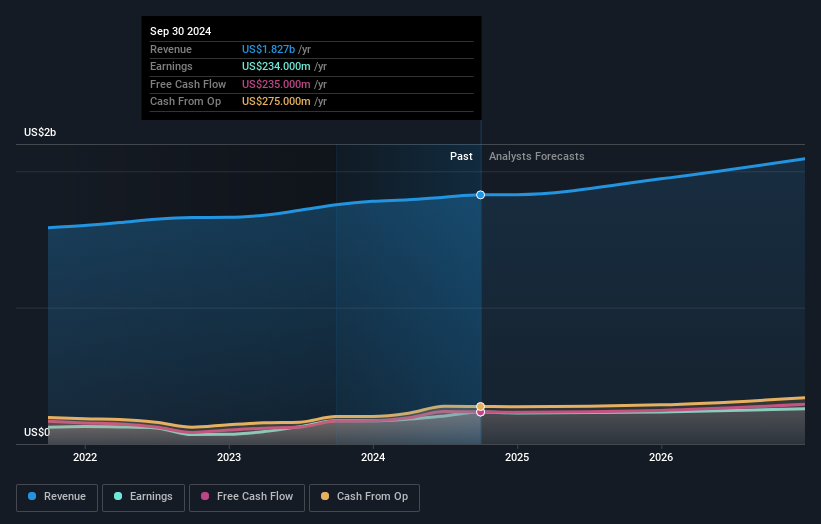- United States
- /
- Consumer Services
- /
- NasdaqGS:FTDR
Should You Investigate Frontdoor, Inc. (NASDAQ:FTDR) At US$58.53?
Frontdoor, Inc. (NASDAQ:FTDR), might not be a large cap stock, but it led the NASDAQGS gainers with a relatively large price hike in the past couple of weeks. The recent jump in the share price has meant that the company is trading at close to its 52-week high. With many analysts covering the mid-cap stock, we may expect any price-sensitive announcements have already been factored into the stock’s share price. But what if there is still an opportunity to buy? Today we will analyse the most recent data on Frontdoor’s outlook and valuation to see if the opportunity still exists.
Check out our latest analysis for Frontdoor
Is Frontdoor Still Cheap?
According to our price multiple model, which makes a comparison between the company's price-to-earnings ratio and the industry average, the stock price seems to be justfied. We’ve used the price-to-earnings ratio in this instance because there’s not enough visibility to forecast its cash flows. The stock’s ratio of 18.97x is currently trading slightly below its industry peers’ ratio of 21.71x, which means if you buy Frontdoor today, you’d be paying a decent price for it. And if you believe Frontdoor should be trading in this range, then there isn’t much room for the share price to grow beyond the levels of other industry peers over the long-term. So, is there another chance to buy low in the future? Given that Frontdoor’s share is fairly volatile (i.e. its price movements are magnified relative to the rest of the market) this could mean the price can sink lower, giving us an opportunity to buy later on. This is based on its high beta, which is a good indicator for share price volatility.
What does the future of Frontdoor look like?

Investors looking for growth in their portfolio may want to consider the prospects of a company before buying its shares. Although value investors would argue that it’s the intrinsic value relative to the price that matter the most, a more compelling investment thesis would be high growth potential at a cheap price. However, with a relatively muted profit growth of 7.7% expected over the next couple of years, growth doesn’t seem like a key driver for a buy decision for Frontdoor, at least in the short term.
What This Means For You
Are you a shareholder? It seems like the market has already priced in FTDR’s growth outlook, with shares trading around industry price multiples. However, there are also other important factors which we haven’t considered today, such as the track record of its management team. Have these factors changed since the last time you looked at FTDR? Will you have enough conviction to buy should the price fluctuate below the industry PE ratio?
Are you a potential investor? If you’ve been keeping tabs on FTDR, now may not be the most optimal time to buy, given it is trading around industry price multiples. However, the positive growth outlook may mean it’s worth diving deeper into other factors in order to take advantage of the next price drop.
With this in mind, we wouldn't consider investing in a stock unless we had a thorough understanding of the risks. At Simply Wall St, we found 2 warning signs for Frontdoor and we think they deserve your attention.
If you are no longer interested in Frontdoor, you can use our free platform to see our list of over 50 other stocks with a high growth potential.
New: AI Stock Screener & Alerts
Our new AI Stock Screener scans the market every day to uncover opportunities.
• Dividend Powerhouses (3%+ Yield)
• Undervalued Small Caps with Insider Buying
• High growth Tech and AI Companies
Or build your own from over 50 metrics.
Have feedback on this article? Concerned about the content? Get in touch with us directly. Alternatively, email editorial-team (at) simplywallst.com.
This article by Simply Wall St is general in nature. We provide commentary based on historical data and analyst forecasts only using an unbiased methodology and our articles are not intended to be financial advice. It does not constitute a recommendation to buy or sell any stock, and does not take account of your objectives, or your financial situation. We aim to bring you long-term focused analysis driven by fundamental data. Note that our analysis may not factor in the latest price-sensitive company announcements or qualitative material. Simply Wall St has no position in any stocks mentioned.
About NasdaqGS:FTDR
Frontdoor
Provides home and new home structural warranties in the United States.
Good value with adequate balance sheet.
Similar Companies
Market Insights
Community Narratives


Recently Updated Narratives


Engineered for Stability. Positioned for Growth.


MINISO's fair value is projected at 26.69 with an anticipated PE ratio shift of 20x


Fiverr International will transform the freelance industry with AI-powered growth
Popular Narratives


MicroVision will explode future revenue by 380.37% with a vision towards success


NVDA: Expanding AI Demand Will Drive Major Data Center Investments Through 2026



